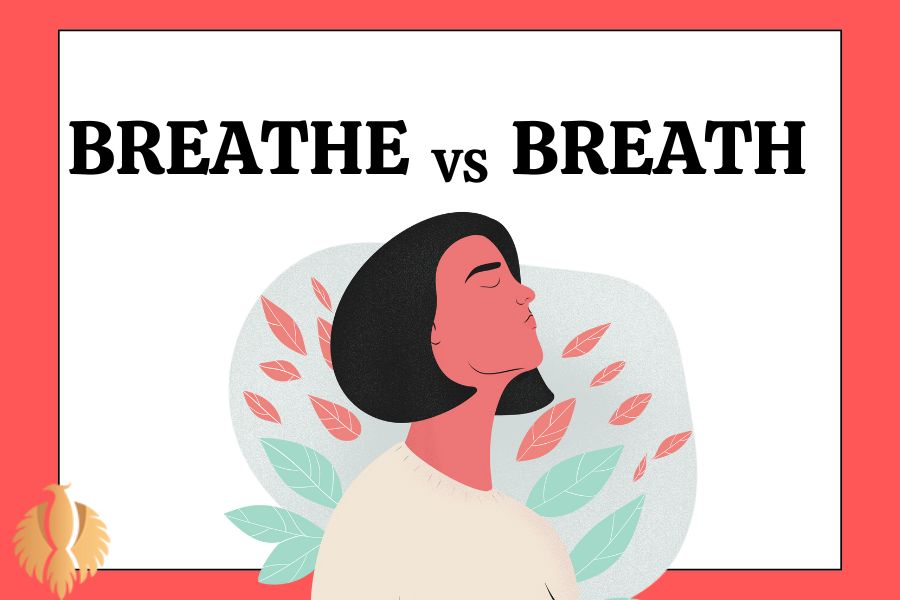What’s the difference between “breathe” and “breath”? Well, it comes down to grammar and pronunciation.
Breathe (with the pronunciation /briːð/ ) is a verb; it’s something you do. Breath (with the pronunciation /breθ/ ) is a noun; it’s the air you take in. They look similar, but they’re used in totally different ways.
It’s funny how a single missing letter can change everything.
You’re reading an email, a novel, or maybe scrolling through social media, and then, there it is.
Breath when they meant breathe. Or worse, breathe when it should’ve been breath.
It’s such a tiny detail, but it jumps out like a typo in a job application; subtle, but jarring.
And yet, even native speakers do it all the time. You probably paused at least once yourself, wondering if you were spelling it right. You’re not alone.
English is full of these sneaky word pairs, those lookalikes that hang around just to mess with our heads.
Think affect vs effect, complement vs compliment, or the classic your and you’re.
But something about breathe and breath feels even trickier. Maybe it’s because they don’t just look alike; they sound almost identical, too. Almost.
This article isn’t just another grammar lesson. It’s a guide for people who care about saying what they mean and meaning what they say.
Whether you’re writing a caption, an academic paper, or just trying to sound confident in conversation, knowing the difference matters more than you’d think.
Because language isn’t just rules and spelling; it’s clarity, precision, and the subtle power to be understood.
So if you’ve ever second-guessed yourself mid-sentence, you’re in the right place.
Let’s take a deep breath and take a closer look at what’s really going on with this oddly confusing word duo.
Why “Breathe” and “Breath” Are So Often Confused
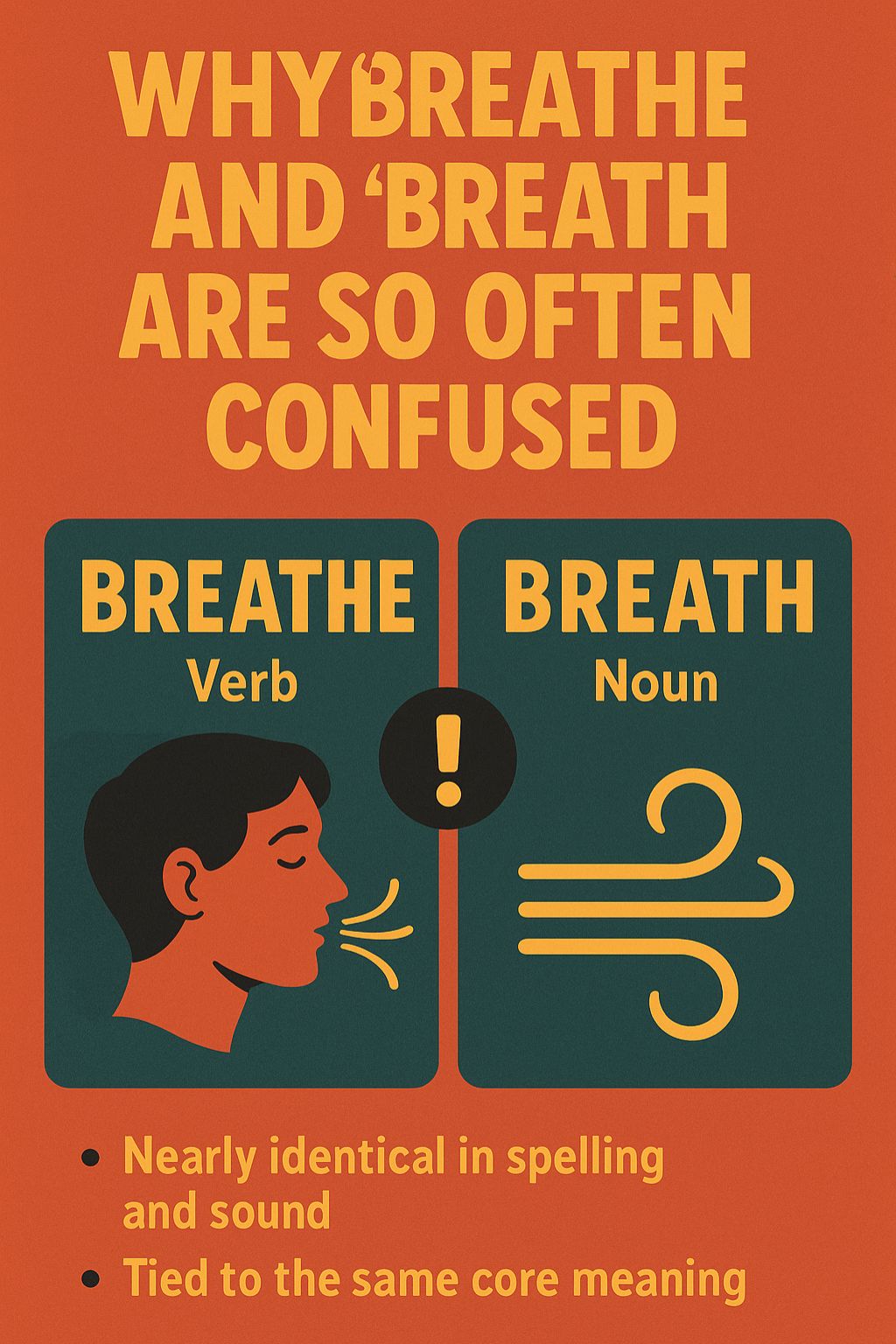
There’s something deceptively innocent about words that differ by just one letter. They seem harmless, even simple, until they quietly derail your sentence.
Breathe and breath belong to a category of words that sit close in appearance, whisper similar sounds, even have very similar meanings, but function entirely differently.
And that’s exactly why they trip people up, again and again.
Part of the confusion comes from the kind of English we consume every day—tweets, texts, captions, emails—all written fast, often edited less.
In rushed writing, one extra letter can disappear without a second thought.
And when that letter changes not just spelling, but the entire meaning and usage of a word, it becomes a recipe for repeated mistakes.
Take lose and loose, for example.
One is a verb that means to misplace something. The other is an adjective that describes the fit of your jeans.
But because they’re only one vowel apart and somewhat close in sound, even fluent speakers end up mixing them.
Then there’s accept and except, same rhythm, different roles.
People often use one when they meant the other, not because they don’t know the meanings, but because the similarity lures the brain into autopilot.
“Breathe” and “breath” do something similar; but sneakier.
They don’t just look alike, they’re tied to the same core idea: air.
So our brains categorize them as interchangeable, even though they aren’t.
Add in the fact that most people don’t stop to parse verb versus noun structure in real time, and it’s easy to see why this mix-up keeps happening.
When a language gives you words that are nearly identical in spelling, whisperingly close in sound, but governed by different rules, you’re bound to stumble.
That’s not a sign of carelessness. It’s just how the human mind processes patterns.
But once you slow down and learn where the paths divide, you’ll never confuse them again.
You might also enjoy: To vs. Too: Which One to Use + 2025 Examples
“Breathe” Meaning, Usage, and Examples

Before we get into the usage and examples, let’s see what this word actually means.
According to the Longman dictionary, it means:
To take air into your lungs and send it out again.
Now let’s slow down for a second, and just breathe.
That little word, soft and light on the tongue, is one we often overlook. It’s simple, quiet, even invisible most of the time.
And yet, without it, nothing lives. Breathe is a verb. A doing word.
It’s what we’re doing right now, even if we’re not thinking about it. Inhale. Exhale. Again and again.
But in English, breathe doesn’t just belong to the lungs, it shows up everywhere. Literally, metaphorically, emotionally.
You’ll see it in yoga classes and in poetry, in medical forms and in breakup texts. It has range.
At its most basic, breathe means to draw air into the body and push it out again. Simple biology. We say:
–She breathed through her mouth because her nose was stuffy.
–The runner was breathing hard after finishing the race.
But let’s be honest; language rarely stays that straightforward.
We use breathe to describe so much more than just air. It’s a verb for relief, release, hope, and even creativity.
Think about how we say:
–Now that the project’s over, I can finally breathe again.
–He breathed life into the character with just a few lines of dialogue.
–The city seemed to breathe at night; quiet, slow, alive in its own way.
In moments of panic, we say, “Just breathe.” In arguments, “Take a breath before you speak.” When we laugh at a joke too hard “I can’t breathe!” One syllable, infinite moods.
And then there’s grammar:
Present: I breathe deeply before every presentation.
Past: She breathed slowly, trying to calm herself down.
Future: He’ll breathe easier once the results are out.
Continuous: They were breathing so heavily after the hike, they couldn’t talk for minutes.
Don’t forget the participles:
–Breathing in the crisp air made her feel alive.
–The dog was breathing fast, clearly exhausted but happy.
Even the command form ”breathe.” carries weight.
Just that one word, standing alone in a sentence, can be grounding. Reassuring. Sometimes, it’s all someone needs to hear.
Now, pronunciation does its own little trick here.
Breathe ends in a voiced “th” sound (/ð/), which vibrates a bit in your throat.
It rhymes with seethe or wreathe.
Not to be confused with breath, which ends more abruptly with a voiceless “th” (/θ/).
It’s a tiny difference, but if you’ve ever paused mid-sentence wondering if you’re saying it right, you’re not the only one.
That silent final “e” changes everything.
What’s beautiful about breathe is how adaptable it is.
It can be literal or poetic, physical or emotional. It can sit quietly in a sentence or carry the full emotional weight of a scene.
It’s soft-spoken, sure. But it shows up when it matters.
You might also enjoy: That vs Which | Correct Usage + 2025 Examples
“Breath” Meaning, Usage, and Examples
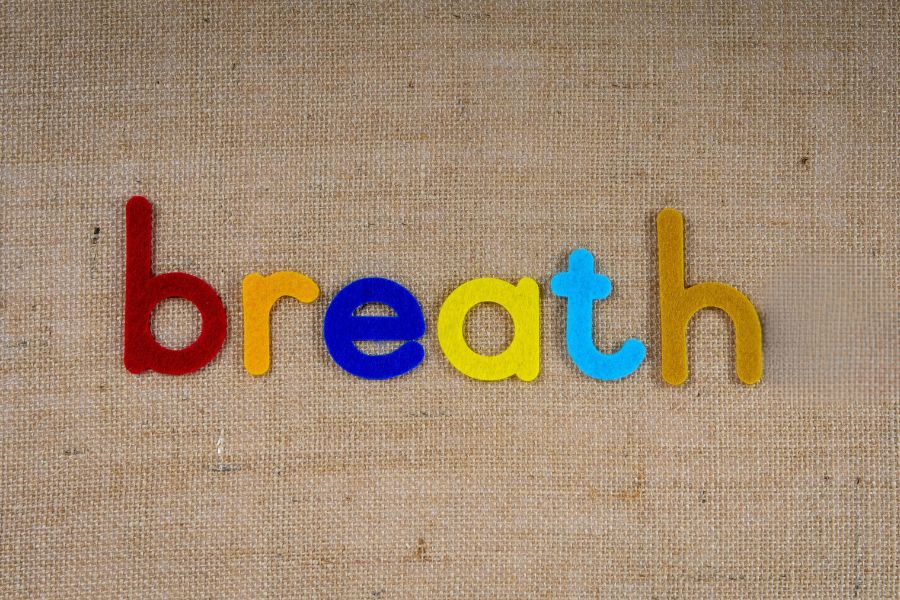
According to the Longman dictionary, breath means:
The air that you send out of your lungs when you breathe
Now let’s talk about breath, the noun, the thing itself. No final “e” here, and yet, this word carries weight.
It’s not about the act anymore. It’s about the moment. The pause. The thing you take in, or hold onto, or lose altogether.
Where breathe is movement, breath is stillness. It’s the product, not the process.
Say it out loud. Breath. Hear how it ends with a gentle stop? That voiceless “th” sound. Like teeth or myth.
No vibration in your throat. It’s shorter, sharper, and more final. And in a sentence, it sits differently.
At its most literal, breath is the air that goes in and out of your lungs:
–She took a deep breath before stepping on stage.
–You could see his breath in the cold morning air.
But just like its verb cousin, breath doesn’t stay confined to biology.
It leans poetic, emotional, symbolic. It becomes a unit of calm, of fear, of beauty, of silence.
Think of these:
–There wasn’t a breath of wind that night, just perfect stillness.
–She spoke so softly, I had to hold my breath to hear her.
–He wasted no breath defending himself, it wasn’t worth it.
And then there’s metaphor. Writers love this word. You’ll find it in novels, in scripts, in lyrics:
–With every breath, she felt the memory fading.
–Their love was like a breath of fresh air, unexpected and reviving.
Breath also pops up in idioms and fixed phrases. Some of the most common include:
- Take a breath – meaning pause, or reset.
- Catch your breath – either physically recover or take a moment.
- Under one’s breath – quietly, usually with a bit of tension.
- Save your breath – don’t waste time speaking; it’s pointless.
You can lose your breath, draw a breath, feel short of breath, or be out of breath entirely.
And every variation tells its own little story.
From a grammar point of view, there’s less to fuss over. It’s a noun, singular and countable.
You can have a breath, your breath, no breath, every breath.
No tenses, no conjugation, just context.
The clarity of a noun is kind of refreshing after the shapeshifting of a verb, isn’t it?
But here’s the thing: people mix breath and breathe up constantly.
Maybe it’s the spelling. Maybe it’s the fact that they’re only separated by one silent letter and a tiny change in pronunciation.
Or maybe it’s because, at their core, they belong to the same world, the essential world of being alive.
You can take a breath. You can hold a breath. But you can’t breath without the “e.”
That’s not a word. That’s just a typo waiting to trip someone up.
You might also enjoy: Acception vs. Exception: Difference + Examples + Spelling
Examples
“BREATHE” Examples (Verb)
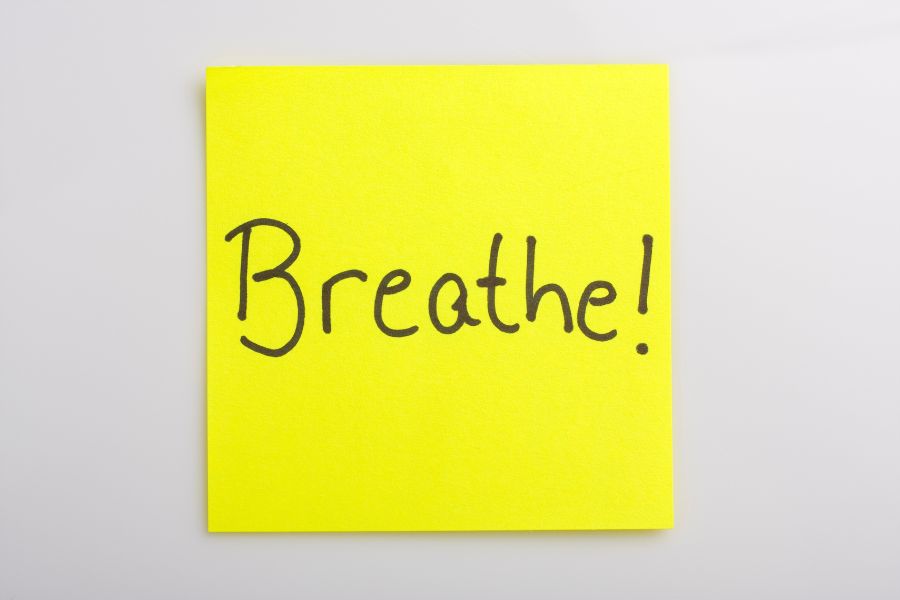
- She told me to breathe; but I swear my chest felt like it was locked in a vice.
- I stepped outside to breathe for a second. The air wasn’t even fresh, but at least it was mine.
- You ever get so overwhelmed that even breathing feels like a chore? That was me, Thursday afternoon.
- He had to remind himself to breathe after she said, “We need to talk.”
- I don’t meditate or anything, but sometimes I lie on the floor and just breathe until my hands stop shaking.
- “Breathe, in through your nose,” the nurse said gently, like I wasn’t on the edge of a panic attack.
- The room smelled like cinnamon and coffee, and for the first time in days, I remembered how to breathe.
- Don’t breathe too hard near him; he’s so sensitive lately, it’ll turn into a whole thing.
- When I’m walking through trees after it rains, I feel like I’m breathing in something ancient.
- She paused mid-sentence, breathed in sharply, and laughed like she just remembered her own punchline.
- The air was heavy with heat, hard to breathe, like the whole town had forgotten how to exhale.
- I swear the cat breathes more heavily when I’m eating something it wants.
- I leaned back in the chair, closed my eyes, and breathed like I was somewhere else entirely.
- When the lights went out, we all just kind of sat there, breathing in the darkness, saying nothing.
- “Breathe out,” he whispered, “you’re safe now.” And for once, I believed him.
- Sometimes I breathe too fast when I’m excited, and my words get ahead of me.
- I could breathe again after she texted back, “I’m okay. Just needed space.”
- You can breathe a little easier now—the worst is behind us.
- She breathed life into that dusty old house just by putting curtains up.
- I didn’t even notice I’d been holding my breath until I finally breathed and felt dizzy from the relief.
“BREATH” Examples (Noun)
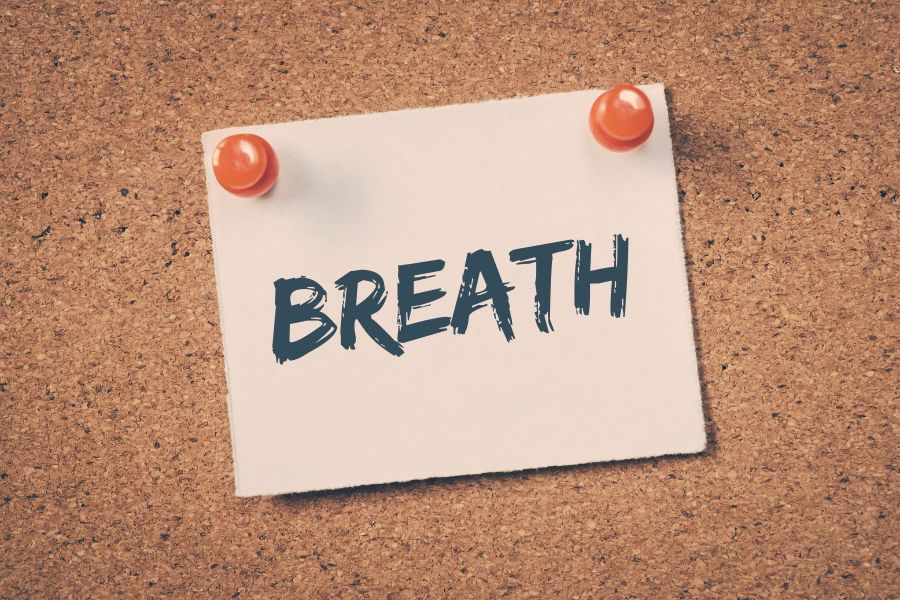
- I took one long breath before opening the message, as if that could somehow soften the blow.
- His breath fogged up the car window as he stared into the streetlights like they had answers.
- “Just one more breath,” I told myself. “Then you can panic.”
- I swear, every breath I take lately feels borrowed, like I’m waiting for someone to ask for it back.
- You could see your breath in the morning chill, little ghosts escaping one after another.
- She let out a breath she didn’t even know she was holding, and suddenly the silence felt different.
- The room went quiet—not a breath, not a rustle—like the walls were waiting.
- He muttered something under his breath, and whatever it was, it didn’t sound friendly.
- I lost my breath laughing so hard at the dumbest meme, like actual tears, gasping and everything.
- That breath before you walk into an interview? That’s not just air. That’s fear, hope, and caffeine.
- Her breath caught when he reached for her hand like it was the most natural thing in the world.
- The baby’s breath was soft, shallow, peaceful. I could’ve watched her sleep forever.
- She took a breath, straightened her shoulders, and told the truth for the first time in years.
- I said it under my breath, but he heard me anyway, and the look he gave? Chilling.
- You need to save your breath; he’s not going to change his mind.
- I caught my breath when I saw the sky turn orange over the lake. It didn’t look real.
- No one dared to take a breath while the final score loaded on the screen.
- The air was so dry it felt like each breath scratched my throat on the way down.
- That last breath before sleep is the one where you finally stop pretending you’re okay.
- When she walked into the room, every breath I’d taken before her felt meaningless.

Hi, welcome to my blog! My name is Omid and I am thrilled to have you here! I am an English language teacher with 12 years of experience and hold multiple international certifications (TESOL, IELTS, TOEFL, PTE, CELTA). Additionally, I hold a PhD in Applied Linguistics with a specialization in Teaching English as a Second Language (TESL), which fuels my passion for teaching English and assisting others in mastering the language. To me, nothing is more rewarding than helping individuals enhance their English language abilities through various methods. So, let’s embark on this journey of learning English together.

